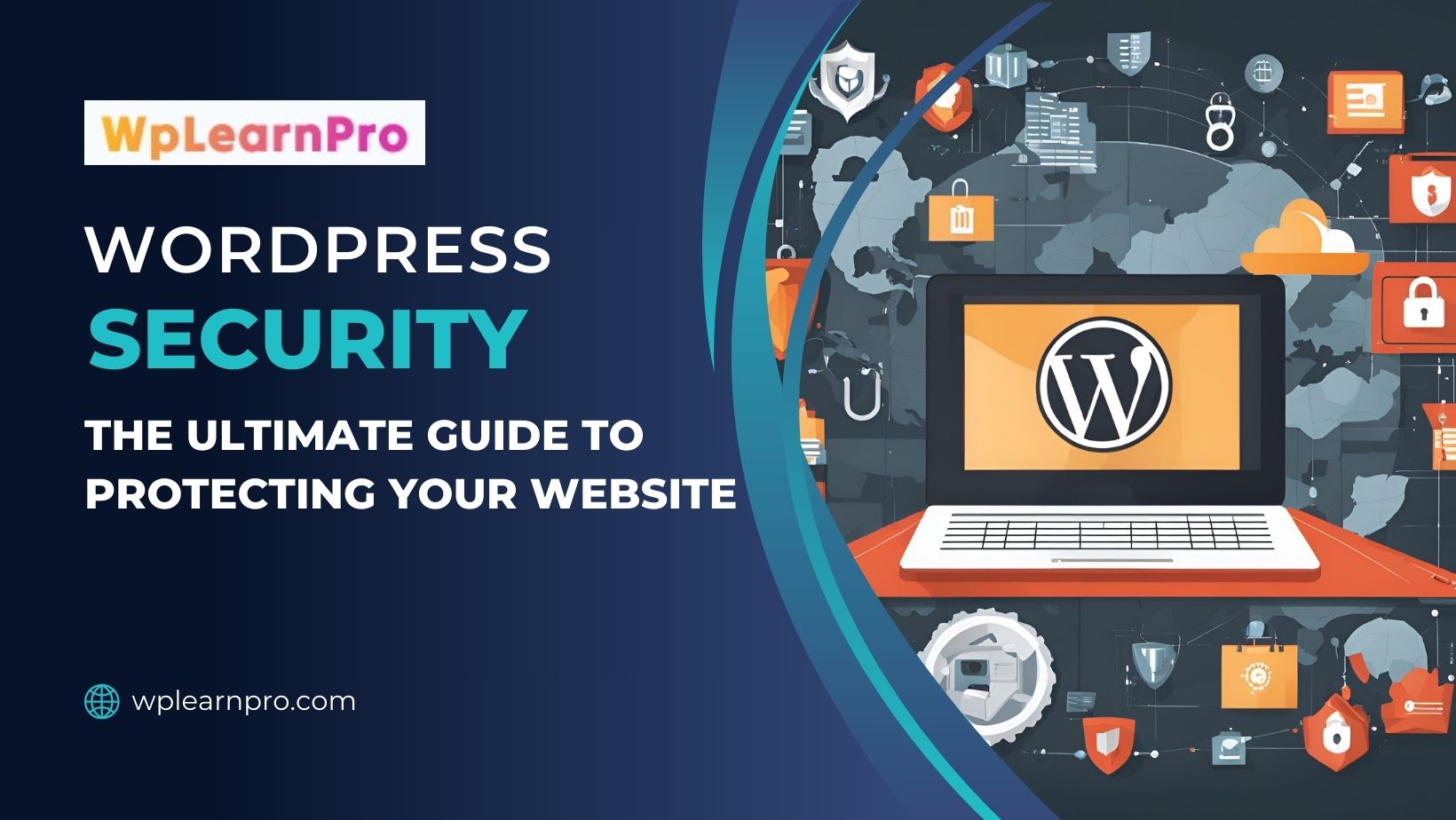WordPress is one of the most popular content management systems (CMS) in the world, powering millions of websites. Its ease of use and flexibility make it a top choice for individuals and businesses alike.
However, with its popularity comes the risk of WordPress vulnerabilities. It’s important to ensure that your WordPress security is upto and protect your data and maintain the trust of your visitors.
Table of Contents
ToggleIntroduction
WordPress is a fantastic platform for building websites. It’s user-friendly, versatile, and powers millions of sites around the world.
But with great power comes great responsibility, and website security is no exception. While WordPress itself has a good security foundation, maintaining a secure website requires vigilance on your part.
This blog post will guide you through everything you need to know to assess your WordPress website’s security and take steps to keep it safe.
Why Website Security Matters
A secure website is essential for several reasons:
- Protects User Data: If your website is hacked, user data like names, emails, and passwords could be compromised. This can lead to identity theft and other serious issues for your users.
- Maintains Reputation: A security breach can damage your website’s reputation and cause visitors to lose trust.
- Prevents SEO Penalties: Search engines like Google may penalize websites that are hacked or contain malware. This can significantly impact your website’s visibility in search results.
- Avoids Downtime: A hacked website can be taken offline or experience performance issues. This can disrupt your business and frustrate your visitors.

Understanding WordPress Security
WordPress, powering over 40% of all websites on the internet, is a prime target for hackers and malicious actors. As such, prioritizing security measures is fundamental to safeguarding your site and sensitive data from potential breaches.
WordPress Security Basics:
Implementing Secure Hosting: The foundation of a secure WordPress website begins with choosing a reputable hosting provider that offers robust security features and regular updates.
Keeping WordPress Core, Themes, and Plugins Updated: Regularly updating your WordPress core, themes, and plugins is crucial to patching vulnerabilities and fortifying your site against emerging threats.
Utilizing Strong Passwords and User Permissions: Enforcing strong passwords and limiting user permissions can significantly mitigate the risk of unauthorized access to your website’s backend.
Enabling Two-Factor Authentication (2FA): Implementing 2FA adds an extra layer of security by requiring users to provide two forms of authentication before accessing the site.
Installing Security Plugins: Leveraging reputable security plugins such as Wordfence or Sucuri can bolster your website’s defenses against malware, brute force attacks, and other malicious activities.
Common WordPress Security Vulnerabilities
Despite WordPress’s robust security features, several common vulnerabilities persist, leaving websites susceptible to exploitation. Understanding these vulnerabilities is paramount to preemptively addressing potential security risks.
Outdated Software: Failure to regularly update WordPress core, themes, and plugins leaves your site vulnerable to known security vulnerabilities that hackers can exploit.
Weak Passwords: Using weak or easily guessable passwords increases the likelihood of unauthorized access to your website’s backend.
Insufficient User Permissions: Granting excessive user permissions can inadvertently provide attackers with unwarranted access to sensitive areas of your website.
Lack of SSL Encryption: Without SSL encryption, data transmitted between your website and visitors is susceptible to interception, posing a significant security risk, especially for e-commerce sites handling sensitive customer information.
Insecure File Uploads: Allowing users to upload files without proper validation can lead to the execution of malicious scripts or the injection of malware into your website.

Assessing Your WordPress Security
There are several ways to assess your WordPress security:
- Security Scans: Several online tools can scan your website for vulnerabilities and malware. These scans can identify potential security risks and provide recommendations for fixing them. It’s important to choose a reputable scanner and be aware that some free scans may have limitations.
- Manual Review: You can also manually review your website’s security settings. This includes checking things like user permissions, plugin versions, and core WordPress updates.
Common WordPress Security Threats
Here are some of the most common WordPress vulnerabilities and security threats facing WordPress websites:
- Brute-force Attacks: Hackers may use automated tools to try and guess your login credentials. This is why using strong passwords is crucial.
- Malware: Malware is malicious software that can be installed on your website without your knowledge. It can steal data, redirect visitors to malicious sites, or disrupt your website’s functionality.
- Vulnerable Plugins and Themes: Outdated or poorly coded plugins and themes can introduce security vulnerabilities to your website.
- Weak Passwords: Weak passwords are easy for hackers to guess or crack. This is the single biggest security risk for any website.

Best Practices for WordPress Security
Protecting your WordPress website involves implementing a multi-layered approach that addresses various security aspects comprehensively.
By adopting the following best practices, you can significantly enhance the security posture of your WordPress site:
- Use Strong Passwords: This applies to all accounts associated with your website, including your WordPress admin login, hosting account, and FTP access. Consider using a password manager to generate and store strong, unique passwords for each account.
- Enable Two-Factor Authentication (2FA): 2FA adds an extra layer of security by requiring a second verification code in addition to your password to log in.
- Keep WordPress Core, Plugins, and Themes Updated: Updates often contain security patches that address vulnerabilities. Make sure to update your WordPress core, plugins, and themes as soon as new versions become available.
- Use a Security Plugin: Several security plugins can help you harden your website’s defenses. These plugins can offer features like login attempt limits, malware scanning, and firewalls.
- Choose a Secure Web Host: Your web hosting provider plays a significant role in your website’s security. Choose a reputable host that offers security features like firewalls and intrusion detection systems.
- Regular Backups: Even with the best security measures, there’s always a chance your website could be compromised. Regularly backing up your website allows you to restore it quickly if something goes wrong.
- Limit User Permissions: Don’t give users more access than they need. For example, if someone is just writing content, they don’t need administrator privileges.
- Disable File Editing: Editing themes and plugins directly from the WordPress admin panel can be risky. It’s better to use a file transfer protocol (FTP) client to edit files directly on your server.
Additional Security Considerations
Here are some additional tips for keeping your WordPress website secure:
- Be Careful with Free Plugins and Themes: Free plugins and themes can be tempting, but they may not be well-maintained or coded securely. Stick to reputable sources for plugins and themes.
- Be Wary of Phishing Attacks: Phishing emails attempt to trick you into revealing your login credentials or clicking on malicious links. Don’t click on links or attachments in suspicious emails, even if they appear to be from someone you know.
- Stay Informed: Security threats are constantly evolving, so it’s important to stay informed about the latest vulnerabilities and best practices. Read security blogs and subscribe to reputable security resources.
Conclusion
By following the steps outlined in this blog post, you can significantly improve your WordPress website’s security.
Remember, website security is an ongoing process. It’s essential to be vigilant and stay informed about the latest threats.
However, by taking these precautions, you can help ensure that your website remains a safe and secure environment for your visitors and yourself.
FAQs
How can I check if my WordPress website has been hacked?
Look for unexpected changes, unusual login activity, or use security scanners.
What steps should I take if my WordPress site is compromised?
Remove malicious code, change passwords, restore from clean backup, update software, and enhance security measures.
Is it essential to use SSL encryption for my WordPress website?
Yes, SSL encryption protects data transmission, enhances credibility, and ensures privacy.
Are there any free security plugins available for WordPress?
Yes, popular options include Wordfence Security, Sucuri Security, and iThemes Security.
How often should I update my WordPress core, themes, and plugins?
Regularly update to patch vulnerabilities and ensure optimal security and performance.
Can I recover my website from a backup if it gets hacked?
Yes, having a recent backup allows you to restore your website to a clean state.
Q: How often should I scan my website for security vulnerabilities?
A: It’s recommended to scan your website for vulnerabilities regularly, ideally at least once a week. Some security plugins offer automatic scanning capabilities.
Q: What should I do if my website gets hacked?
A: If you suspect your website has been hacked, the first step is to isolate the issue and prevent further damage. This may involve changing your login credentials and temporarily disabling plugins or themes. You may also need to restore your website from a backup. It’s recommended to seek help from a security professional if you’re unsure how to proceed.
Q: Are there any security measures specific to e-commerce websites?
A: Yes, e-commerce websites require additional security considerations. These include using a secure payment gateway, storing customer data securely, and complying with industry-standard security practices.
Q: I’m not very technical. Can I still secure my WordPress website?
A: Yes! Many of the security measures outlined in this post, such as using strong passwords and keeping software updated, are easy to implement even for non-technical users. Additionally, many security plugins offer user-friendly interfaces that make website security more accessible.
Q: Where can I learn more about WordPress security?
A: There are many resources available online to learn more about WordPress security. The official WordPress website offers a security handbook https://wordpress.org/about/security/. You can also find helpful information on security blogs and websites of reputable security companies.

